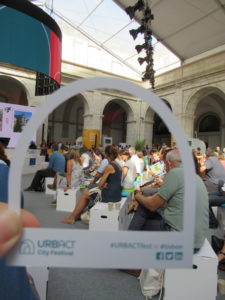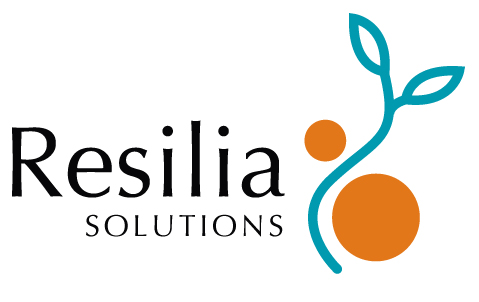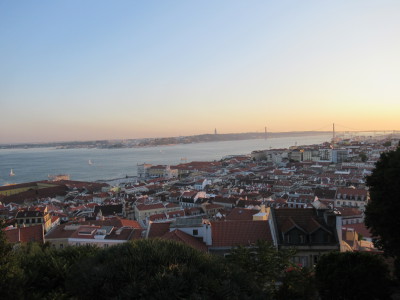
The URBACT City Festival in Lisbon, Portugal, on 12-14 September 2018, was the third URBACT City Festival that had taken place and that I had attended. Back in 2015, the first City Festival in Riga promoted the launch for the new URBACT III Action Planning Networks and we facilitated a workshop on our capitalization work on Social Innovation in cities, together with François Jégou. The second City Festival, in 2017 in Tallinn, promoted the 97 labelled Good Practices and I facilitated two workshops including one citizens’ and stakeholders’ participation for environmental projects. This years’ festival was going back to the Riga one by celebrating the URBACT III APNs, where François Jégou and I diffused the outcomes of the REFILL network on Temporary Use.
URBACT is good at capitalising: at extracting what takes place in cities in order to make it visible to other but also at gratifying those making a positive change, and acting as drivers, at home and beyond, for a more sustainable society. My fanaticism for URBACT is not new.
Each time URBACT surpasses itself and goes in unexpected directions. The first City festival was highly intense, diverse and rich, with a high focus on creativity. The second one was focusing on the experiences of the good practices – and their concrete work, networking, and learning from each other. This year, it was expected to be once again full of energy and key takeaways, while focusing on what we have achieved in the APN but also in the past 15 years of URBACT. How was going to feel like? Who were we going to meet and get inspired from? Who and what would surprise us? What would we take home? I must say, a few days before the opening cocktail, I was both excited and curious: what has URBACT imagined this time, in order to make change happen in our cities, throughout concrete actions, a network of like-minded practitioners and experts, serious and intense work, under the misleadingly relaxing name of “CITY FESTIVAL”? In the end, what I took away were some snapshots of the City, the URBACT world and methodology and some reflections about the future of cities.
GETTING TO KNOW LISBON
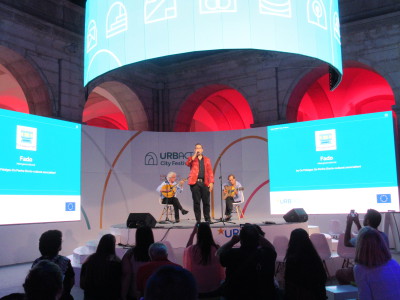
To start with, the city Festival was totally embedded in nowadays’ reality of the Lisbon. The launch cocktail was organized at the São Jorge Castle, which can only remind us of our link with North Africa and our common culture. We were offered insights into local artistic movements and people, who seek to make a difference and bring about a new vision to their environments: a concert garbage collectors drums by Largo Residencia Glum, Cape Verde batuque rhythm with a platform for womens’ rights “Remedi Terra”, a poetic play without words by GTeatro, “If you can’t” read, look at the figure”. Traditions were also at the heart of our cultural bath with an intergenerational Fado collective Os Fidalgos da Penha. “Did you talk to the lady over there”? a dozen of people asked me the question , referring to Teresa Ricou, 70, who since 1974 has focused on the social integration of youngsters by training them, notably converting a former orphanage into a circassian school at Chapito, created in 1981, where we had our closing event. All these are without mentioning the walkshops organised throughout the city during the two days on housing projects in Alcântara, on gender equal cities, on placemaking as a catalyst for improving public spaces, the city heritage crisis, digital city futures, migration integration in Amadora, on revitalising the retail sector in Baixa-Chiado, on Semear na Terra in Oeiras, in the eco-neighbourhood Boavista Ambiente, on tackling urban poverty from the ground up in Marvila, … These supported our cultural, sociological, political and urbanistic discovery of the city at the same time as working hard on the present and future of our cities.
A UNIQUE MOMENT TO MEET AND EXCHANGE
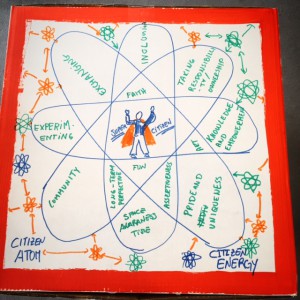
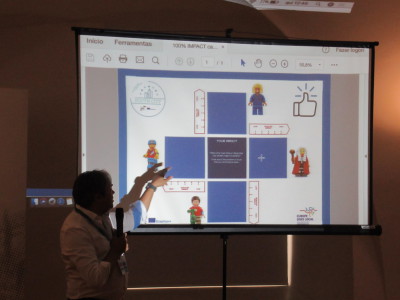
The URBACT City Festival, Summer Universities, National thematic seminars and all other kinds of URBACT events are there to network, to get to know each other – in informal and so-called “white” moments, to learn from other cities, on some specific issues, to get familiar with the programme but also to concretely co-construct solutions for our cities. This is also the moment when some projects were born: networks but also some tools and policies. I’d like to share an unexpected story. In May 2015, URBACT organised its first City festival. A part of it was geared towards creativity and ideation. During one of the activities (which was actually the outcomes of previous activities scattered along two days), a group of us created a “Citizen Atom”. The concept was to put citizens at the heart of local policies in empowering them. At the end of the festival, participants voted for their most preferred idea, our group came second on the podium. Life moved on. A year later, in 2016, I bumpt into Carlos de Sousa Santos, from the City of Braga, at the URBACT Summer University in Rotterdam: he showed me our Citizen Atom that he had taken forward as a concept for youth policies in his city. A year and a half later, in November 2017, I saw him again at a meeting of the Boostino project in Paris: he was actually carrying out an Erasums + project on the Youth City developing his approach. Now, seeing him in Lisbon at the URBACT City Festival, he presented the full approach, integrated in his City strategy. This is the way a creative exercise organized by URBACT became a local policy. This makes unique people develop unique solutions for their cities.
SHOULD WE BE AFRAID?
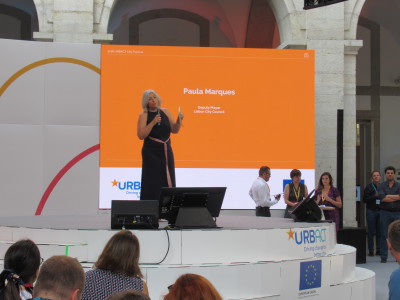
I must say, I ended the Festival with a mixed feeling: for the first time, I felt the urgency to act but also the concrete difficulties. Indeed, Paula Marques, Deputy Mayor of the City of Lisbon, welcomed us and launched the Festival by being clear about today’s situation: “In these times of fear, we need to fight the global system with participatory democracy”. Yet, how can you convince cities which are not in the “URBACT mood” to join? To be open to integrated approach? To dedicate time and energy to changing the way cities are made? To make their mandate meaningful? What tips can you give for civil servants to convince their elected representative to steer a new process? For elected representatives to change the tasks and ways of working of their city’s civil servants? Even for the cities already in URBACT: how can you cope with the fact that after two years and a half of co-creation of a Local Action Plan, a newly elected Mayor bypasses this work and goes in his/her own direction?
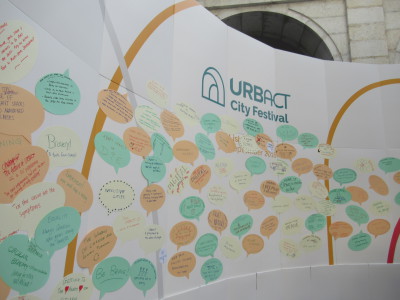
We then had a discussion with Magdalena Skiba, from the City of Gdansk, who was very optimistic. She could feel that co-creation was going on. That cities were increasingly connected and innovating. This had to go along with the efforts to keep on working together, but she could see and feel this was really happening. She could also the urge to feel the ownership of cities. She reminded of the feeling I had when working on the case of Gdansk: a mixed feeling of utopia feeling following More’s approach to it, the vision of Pawel Adamowicz, Gdansk’s Mayor: we can have a vision to make the world but do we need to impose it? Is it the best way to do it?
But also, Ania Rok, Master of Ceremony of the Festival made it clear: “the actors of change in cities have a rising role”. These actors being “us”: city officials, civil servants, stakeholders, private actors, civil society, just citizens. Yet, we need to be empowered at all levels of city governance. To get know each other, to be open to each other, to learn from each other, to be humble and transparent. To accept ours and others’ ego and cope with it.
“URBACT MAKES US CONFIDENT”
Yet, that is one of the key messages the participants took away from the Festival and my concluding takeaway as well. Confident in knowing we do the right things, confident that we are not alone, confident that the transition we are supporting is not easy, confident that we can do it, and that altogether we can do it better. And cities at are the heart of this. There are many challenges ahead and we are responsible for it. We can act on it. We should act on it.
